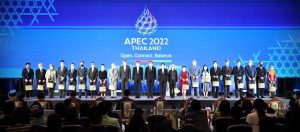Earlier this year, I wrote about how Thailand’s chairmanship of the Asia-Pacific Economic Cooperation (APEC) has been complicated by the Russia-Ukraine war. About two months after that article was published, a meeting between APEC trade ministers indeed ended on a sour note without a customary joint statement following a walkout by the United States and four allies during Russian Economic Development Minister Maxim Reshetnikov’s speech. A similar incident also occurred in Indonesia, this year’s G-20 chair.
Things are looking even more discouraging as the end of the year approaches. The winds of war between Western liberal democracies and the “authoritarian” bloc are gaining strength, as highlighted through Russia’s latest annexation of four Ukrainian regions and first military mobilization since the Second World War, Ukraine’s accelerated bid to join NATO, North Korea’s flurry of missile tests amid failed denuclearization talks and declaration of support for Russia’s territorial expansion, and persistent tensions between the U.S. and China.
Furthermore, there is the gloomy global economic outlook and the issue of dollar hegemony, concerning how the U.S. Federal Reserve’s aggressive interest rate hikes to curb inflation have inevitably led to the devaluation of other currencies and have exacerbated financial woes in many economies.
Trying to host a multilateral summit in such a disunited and chaotic international environment would be difficult for any government. A gathering of 21 APEC heads of state is scheduled to run in Bangkok on 18-19 November while the G-20 counterpart will take place slightly earlier in Bali on 15-16 November, and both host countries can expect some drama. Competing powers will almost certainly use the multilateral platform to propagate their worldviews, much like how the U.S. and China openly clashed over trade visions at the 2018 APEC summit in Papua New Guinea. Worse still, “neutral” nations like Thailand and Indonesia could be cornered and pressured to pick sides.
Like it or not, political jousting between major powers – anyplace, anywhere, anytime, and at any level – is pretty much the new (or renewed) normal. Thus, for host countries that seek to reap political benefits from the presence of world leaders, having all top leaders from competing power blocs attending the summit and risking extra drama in the process is arguably better than having “incomplete” attendance and being forgotten. The latter points to the host country’s diminished international recognition, and this appears to be the case for Thailand.
So far, Chinese president Xi Jinping is the only one among the leaders of the great powers to have verbally confirmed his APEC attendance. Russian President Vladimir Putin and U.S. President Joe Biden, meanwhile, are missing in action. Both, however, have reportedly accepted the invitation to the G-20 Summit in Bali, which will take place almost immediately before the Thai APEC event.
Putin’s prioritization of the G-20 makes much sense. Unlike APEC, which focuses solely on the Asia-Pacific, G-20 is much more “global.” With the participation of European leaders and potentially Ukraine’s president Volodymyr Zelenskyy, the stakes at the G-20 are higher for Putin. But the same cannot be said for Biden. As a proclaimed champion of liberal internationalism, his blatant prioritization of the G-20 and lack of attention to APEC naturally raises questions.
It has been reported that Biden will skip the Bangkok APEC summit and will send Vice President Kamala Harris instead. There is, of course, nothing wrong with dispatching the vice president to do the job. Harris, in particular, has been playing an active role in diplomacy for the Biden administration.
Still, for the Thais, Biden’s decision not to attend the Thailand-led APEC summit is concerning and probably feels like a slap in the face. After all, Thailand has repeatedly expressed its hope of seeing the U.S. president at next month’s APEC gathering, especially considering that the APEC chairmanship will be transferred to the U.S. next year. Prime Minister Prayut Chan-o-cha (who has just resumed duties following a five-week suspension), for instance, brought this topic up during his encounter with Biden at last year’s COP26 conference and once again during talks with Secretary of State Antony Blinken in Bangkok back in early July of this year.
Washington clearly knows how important APEC is for the Thais and, given the closer Thailand-U.S. engagement in recent months and the Biden administration’s apparent willingness to uncharacteristically turn a blind eye to the issues with Thailand’s democracy, the Thai government seemed certain that Biden would make an appearance at APEC, if not in person then via video link.
Then there is Biden’s rather absurd official reason for skipping APEC: to attend his granddaughter’s wedding. This, together with the president’s G-20 participation, has badly embarrassed a longstanding treaty ally and partner.
Thailand’s Foreign Minister Don Pramudwinai said that the focus will be on “which countries will or will not be coming” rather than “the persons representing them,” yet he also noted that he would try to “talk Biden into attending” the APEC summit. Despite maintaining a nonchalant tone in public, the Thai government is evidently frustrated.
To a significant degree, however, Thailand’s weakening global standing is self-inflicted. The Thai government has been preoccupied with domestic troubles and has maintained a low profile – perhaps too low – in global and regional affairs, most likely to avoid getting dragged into great power conflicts. This approach, while good for the country’s survival, needs to be re-evaluated if Thailand wishes to regain its former diplomatic stature. When wearing an invisible cloak, one cannot possibly expect others to notice one’s presence.

































